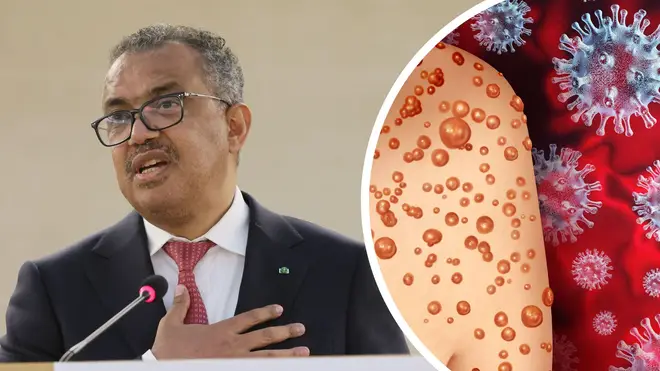
Clive Bull 1am - 4am
15 June 2022, 13:54

Monkeypox is set to be given a new name after scientists complained it could trigger racism.
Experts said the way it is referenced as African is "discriminatory and stigmatising" and said it should be called hMPXV.
Dr Tedros Adhanom Ghebreyesus, the World Health Organisation's [WHO] director general, said the UN health agency will be "working with partners and experts from around the world on changing the name of monkeypox virus, its clades and the disease it causes".
Some 30 scientists wrote a letter calling for a rebrand last week, pointing to an "increasing narrative in the media and among many scientists that are trying to link the present global outbreak to Africa or West Africa, or Nigeria".
Read more: Monkeypox outbreak: What is the virus and how does it spread?
They said: "The most obvious manifestation of this is the use of photos of African patients to depict the pox lesions in mainstream media in the global north."
And they went on: "As any other disease, it can occur in any region in the world and afflict anyone, regardless of race or ethnicity.

Monkeypox is not a 'gay disease',
"As such, we believe that no race or skin complexion should be the face of this disease."
The UK had recorded 470 monkeypox cases by Monday, mostly in gay and bisexual men.
A WHO adviser said the latest outbreak was likely driven by sex at raves in Spain and Belgium, but anyone of any orientation is susceptible to it, especially through close physical contact or through clothing and bed sheets.
Read more: UK rescued 444 migrants from the Channel yesterday amid Rwanda deportation 'farce'
The health agency is still against mass vaccination but recommends its "judicious" use, saying that controlling the disease will require surveillance, case tracking and isolation.
Brits with monkeypox have been asked to isolate for 21 days.
Dr Tedros said more than 1,600 cases and nearly 1,500 suspected cases have been reported this year in 39 countries.
A total of 72 deaths have been reported but none have happened in the newly affected countries, like the UK.